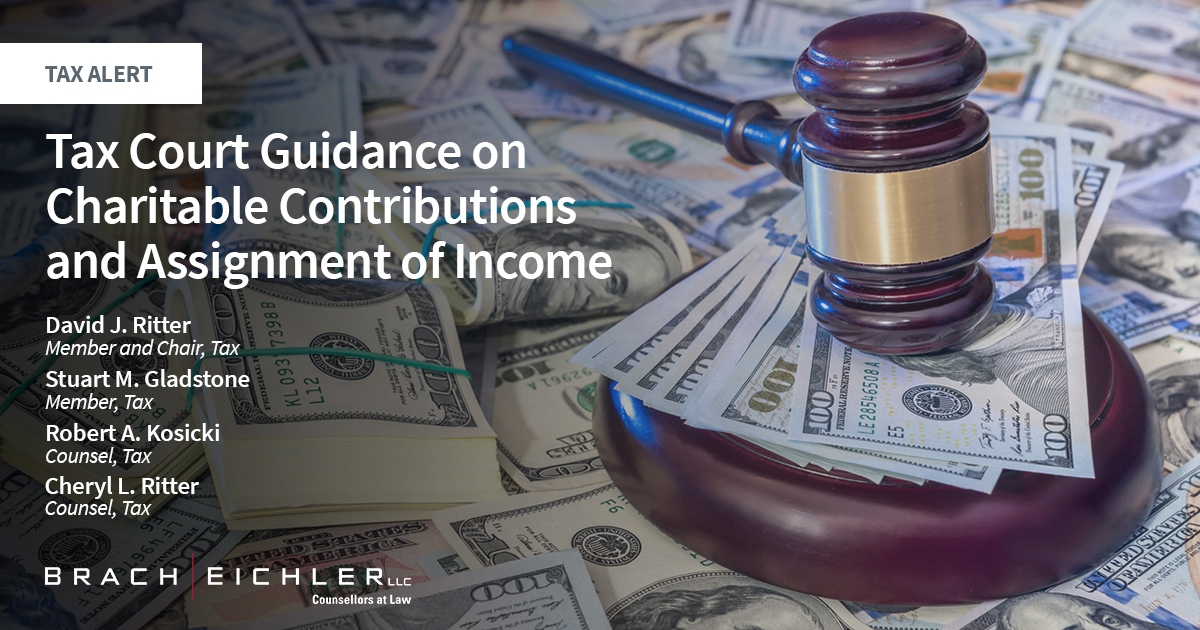

The Assignment of Income Doctrine: A Tax Trap for the Generous but Unwary A Practitioner's Guide to the Anticipatory Assignment of Income
- Posted on May 30, 2024
Flashbacks, Squirrels, and the Assignment of Income Doctrine
Understanding the assignment of income doctrine is crucial for taxpayers who want to pass their earnings to another individual or entity before receiving the income themselves. Equally important is grasping the Federal income tax treatment of such assignments to avoid unexpected tax liabilities. This doctrine, examined by Federal courts since the early 20th century, dictates that income must be taxed to the person who earns it, regardless of any anticipatory arrangements or contracts. Simply put, the IRS is more concerned about who’s holding the purse strings than who’s pocketing the change.
The irony of the adage “even a blind squirrel finds a nut every once in a while” is not lost on you as you receive a visit from your dactylally deficient Cousin Elmer . As you may recall from our post on the FBAR filing requirements , Cousin Elmer has seven and a half fingers, a reminder of his unsuccessful guerrilla attack on a scurry of squirrels living in his attic using what can only be described as a Vietnam-era improvised explosive device. That Elmer has as many flashbacks of “Charlie” as he does of those poor squirrels I, you think to yourself, karma in its purest form.
For reasons unknown to you, Elmer made a small fortune in the fireworks industry. Though he left his job as chief munitions advisor three years ago after the unfortunate sciurine incident that cost him two and a half fingers (and not a small amount of his dignity), he earns royalties on a few patents that he developed including, “The Screaming Weasel,” “The Ring of Thunder,” and his personal favorite “Click, Click, Boom!” [1]
Elmer informs you that he has more than enough money, and he is tired of paying taxes to “The Man.” ( You’ve come to understand that The Man is anyone in a position of authority, whether it be the entire Federal government, or Billy Joe, the manager of the bait shop, who has kicked Elmer out no less than seven times over the past six months. )
As such, Elmer wants you to draft up a contract whereby the royalties, which would have gone to Elmer, instead are paid directly to his illegitimate but charming son, Cletus.
After establishing goodwill with Elmer by affirming that “we” hate Billy Joe, [2] you sit him down for another one of your much appreciated tax talks, this time about the anticipatory assignment of income doctrine.
The Doctrine in a Nutshell
From time immemorial (or at least since 1930), [3] “the first principle of income taxation [is] that income must be taxed to him who earns it.” [4] This principle holds true even if the right to that income is assigned to another person or entity. [5] An individual who earns income cannot escape taxation “by anticipatory arrangements and contracts however skillfully devised….” [6] You can see that Elmer understood at least a few snippets of what you just explained, as he lets out a huge sigh of disappointment leaving him, quite literally, deflated.
The assignment of income doctrine determines who is responsible for the tax on income, focusing on who earned the income or who controls the earning of the income rather than who ultimately receives it. [7] If the assignor retains dominion over the income-generating asset, they cannot escape taxation by assigning the income. [8] This focus on control “preserves the principle that income should be taxed to the party who earns the income and enjoys the consequent benefits.” [9] Because Elmer earned the royalties, and he controls the right to direct the income to Cletus or whomever scuttles Billy Joe’s bass boat, the income will be taxed to Elmer, even if he never actually receives it.
History of Anticipatory Assignments of Income
For nearly a century, [10] federal courts have held that income generated from personal services must be reported in the gross income of the individual performing such personal services. [11] Similarly, income derived from property should be reported in the gross income of the person that maintains beneficial ownership of that property. [12] The process of identifying the true beneficiary of income‑producing property is a matter of examining the facts and circumstances of each assignment, including which taxpayer has the authority over the property and can enjoy its economic benefits or bear its economic burdens. [13]
When any individual or entity attempts to “avoid taxation by entering into a contractual arrangement whereby that income is diverted to some other person or entity,” courts have nearly universally held that this anticipatory assignment of income is improper, and such income “must be taxed to [the person or entity] who earns it.” [14] The Supreme Court has gone as far as to state that this doctrine is a “foundational rule” of U.S. income taxation. [15]
Nearly a century ago Justice Oliver Wendell Holmes articulated the doctrine of anticipatory assignments of income in his seminal opinion in the case of Lucas v. Earl . [16]
In Lucas , the taxpayer‑husband entered into a contract with his wife whereby she became entitled to one-half of any income he might earn in the future. On the belief that a taxpayer was accountable only for income he actually received, the husband thereafter reported only half of his income. Nay, nay , sayeth Justice Holmes.
The Supreme Court was unwilling to accept that tax laws permitted such easy deflection of a taxpayer’s income tax liability, and it held that the taxpayer-husband was responsible for the entire amount of his income. Subsequent to Lucas , numerous Supreme Court and Tax Court opinions have held that such anticipatory assignments of income are ineffective as means of avoiding tax liability. To this end, in a 2021 Tax Court decision, authored by the inestimable Judge Mark V. Holmes, [17] the Tax Court observed that “the assignment-of-income doctrine does not immunize assignments of income to…entities.” [18]
The Assignment of Income Doctrine and Trusts (Contrary Results…Sometimes)
In the Supreme Court case of Blair v. Commissioner , [19] a taxpayer assigned the income from a testamentary trust to his children. The trustee accepted the assignment and distributed the income directly to the assignee. The Supreme Court was faced with the question of whether an assignment of income from a trust, which income was received by the beneficiary-children, was valid.
Because there were no earnings from personal services, which would have been taxed to the individual who earned them, the court found that Lucas was not on point. Instead, “the tax is upon income as to which…the tax liability attaches to ownership.” [20] Stated differently, if an individual owns a beneficial interest in the trust, then that individual will be taxed on his or her income derived from the trust.
“If under the law governing the trust the beneficial interest is assignable, and if it has been assigned without reservation, the assignee, thus, becomes the beneficiary and is entitled to rights and remedies accordingly.” [21] Instead, “[t]he one who is to receive the income” through the assignment of the beneficial interest (the assignee) rather than the initial income beneficiary (the assignor), becomes “the owner of the beneficial interest” and is responsible for paying the tax on the income distributed from the trust. [22]
The phrase “without reservation” is critical, as the taxpayer learned in Harrison v. Schaffner , [23] where the Supreme Court determined that an assignment of specific dollar amounts of trust income for one-year periods did not shift the tax burden to the assignee. In reaching its decision, the Court distinguished Blair , where the assignment was irrevocable for the life of the taxpayer , in contrast to the one-year assignments under review, which the Court found did not create a transfer of a substantial interest “without reservation” in the property. [24]
Similarly, in Rev. Rul. 55-38, the IRS determined that a beneficiary, who periodically gave his consent to pay a certain portion of the trust income to another individual, was responsible for the tax on such income. This arrived at this determination because the assignor had not parted with a substantial interest in property other than the specified payments of income, the right to which he could have revoked at any time.
Income from Services
If a taxpayer performs personal services for compensation, the income is includible in the taxpayer’s gross income [25] —even if the taxpayer assigns and transfers the compensation to a third party. Even if a taxpayer redirects a payor’s check to a third party without cashing it, the taxpayer must include all income the taxpayer earned from the performance of personal services attributable to the payment. [26]
This holds true if the check is sent to a third party at the direction of the taxpayer, who never touches the check, [27] or if payment is made to the third party through other means. The income must be included in the taxpayer’s gross income. The same applies if the payor uses the amount to settle a debt of the taxpayer. [28] Additionally, a taxpayer may not escape assignment of income by assigning accounts receivable that arise from the taxpayer’s performance of services but remain unpaid. [29]
If a taxpayer endorses a compensation check to a third party and receives back less than the total compensation, the entire amount still must be included in their gross income. [30] This inclusion requirement is unaffected by whether the income is paid to another person under a court order, as long as it represents compensation for services performed by the taxpayer. However, the assignment of income doctrine does not apply if the transferor-taxpayer’s right to the income in question is contingent and subject to conditions beyond the control of the transferor. [31]
The fundamental rule that income from the performance of personal services is included in the service-provider’s income applies equally if the assignee is an entity. Thus, in the case of Johnson v. Commissioner , [32] the taxpayer formed a Panamanian corporation to which he assigned his NBA earnings. The NBA sent the check to the corporation rather than the taxpayer. Nevertheless, the Tax Court held that under the contract the taxpayer was to play basketball, and in return he would earn compensation; therefore, the contract was between the team and the taxpayer, not the taxpayer’s entity. Instead of looking at the “actual earner” of the compensation, the Tax Court turned to the inquiry of “who controls the earning of the income.” [33]
Similarly, in Leavell v. Commissioner , [34] the Tax Court held that a professional basketball player was an employee of the team for which he played even though the team had executed an employment contract with the player’s professional service corporation (“PSC”). The Tax Court reached this conclusion by “examin[ing] all the facts and circumstances in order to determine the reality of who has control over the manner and means by which the individual service provider delivers services.” [35]
The Tax Court decided numerous cases in the 1980s, [36] in which the court held that income was not re-allocable from a PSC to the service‑provider under the assignment of income doctrine if the service-provider met both prongs of a two-prong control test evolving from case law beginning with Lucas . Under this two-prong test, a PSC controls the service-provider, and, hence, earns the income, if: (1) the service-provider is an employee of the PSC, and the PSC has the right to direct and control him or her in a meaningful sense; and (2) the PSC and the service-recipient had “a contract or similar indicium recognizing the controlling position of the PSC.” [37]
By contrast, if a contract exists between the taxpayer’s entity and a third-party, the assignment of income doctrine historically has not been applied by the Tax Court. [38] In the case of Laughton v. Commissioner , [39] an actor formed a corporation with which he contracted to receive a weekly payment for his exclusive services. The corporation executed contracts with two film studios, and the corporation “loaned” the taxpayer’s services to the film studios.
The Court held the amounts paid to the corporation by the studios were not includible in the taxpayer’s gross income because those amounts were paid “under contracts between it [the actor’s corporation] and the studios,” and, as such, there was no assignment of income by the taxpayer. [40] This result is contrary to Leavell , but the Tax Court found the facts and circumstances distinguishable. (Translation: the wind blew in a different direction for the taxpayer in Laughton than it did for the basketball player in Leavell .)
Assignment and Transfer of Income-Producing Property
As noted in the introduction, income produced by the transferred property should be reported in the gross income of the person who holds the beneficial ownership of that property. [41] Stated differently, a taxpayer’s gross income includes income from property over which the taxpayer exercises the same degree and manner of control that the taxpayer exercised before the attempted transfer. [42]
In Commissioner v. Sunnen , [43] the taxpayer-husband assigned the underlying contracts to receive royalties on the taxpayer-husband’s patented invention to his wife in addition to giving her the right to receive the royalty payments. It is important to note that in Sunnen , the failure of the husband to give up control over the underlying licenses (contracts) scuttled the assignment. This retained control arose out of two separate considerations. First, the assignment consisted of nonexclusive licenses, which were terminable by either party without liability. Second, the licenses were held by a corporation, of which the taxpayer-husband owned 89% of the stock.
As president, director, and owner of 89% of the stock of the corporation, the taxpayer remained in a position to exercise extensive control over the license contracts after assigning them to his wife. Thus, any assignment of the underlying contracts must not “merely involve[] a transfer of the right to receive income;” instead, the assignment must take the form of “a complete disposition of all the taxpayer’s interest in the contract and the income.” [44]
Similarly, in Schaffner the Supreme Court observed that “[e]ven though the gift of income [was] in form accomplished by the temporary disposition of the donor’s property which produces the income.” [45] Thus, the Court found that the donor retained “every other substantial interest in it, [and the Supreme Court has] not allowed the form to obscure the reality.”
Ultimately, the Supreme Court held that the assignment of the income for the tax year of the trust of which the taxpayer was a beneficiary was not a substantial disposition of trust property so as to disrupt the taxpayer’s enjoyment of the income from the property, and the taxpayer’s power to assign the income was a benefit of the right to receive that income. Thus, the assignment of income doctrine applied.
The assignment of income doctrine also comes into play when a taxpayer attempts, but fails, to completely transfer their property. In such scenario, the income derived from the property must be included in the gross income of the taxpayer, not in that of the intended recipient. Instances where this is particularly relevant include invalid gifts, where the failure to effectively shift the income to the assignees results in the income reverting to the donor. Similarly, transactions masquerading as sales but failing to genuinely transfer ownership rights are not recognized as legitimate transfers under this doctrine.
For a property transfer to be considered valid, a fundamental shift in the economic relationship between the taxpayer and the property is necessary. This means that if the taxpayer retains any significant rights or control over the property, such as risk of loss or full authority, the transfer is deemed ineffective. The mere intention to transfer property at a future date does not suffice. Conversely, if a transfer is bona fide, with the transferor relinquishing all control over the property, the assignment of income doctrine will not apply. Likewise, if the rights retained by the transferor are negligible, the doctrine is not applicable.
The doctrine further stipulates that an agreement to allocate the income generated by a taxpayer’s property to someone else does not constitute a transfer of the property itself. Consequently, the income remains part of the taxpayer’s gross income. Moreover, if the property is not effectively passed to the transferee, owing to a lack of delivery effort by the taxpayer, the transfer is considered null, and the resulting income is included in the taxpayer’s gross income.
When assessing whether a transfer by purported gift is valid, several conditions must be met: (a) the donor must be competent to make the gift; (b) the recipient must be capable of accepting the gift; (c) the donor must have a clear intention to irrevocably transfer the title, dominion, and control of the property; (d) the transfer must be irrevocable; (e) there must be actual delivery of the gift or control over it; and (f) the recipient must accept the gift. Failure to meet any of these conditions results in the income from the property remaining with the original owner for tax purposes.
The assignment of income doctrine is complicated and nuanced. There are, however, a few black letter rules that we can distill from the morass of the judicial creation:
- Income is taxed to the person who earns it, even if the right to that income is assigned to another person or entity. [46]
- An individual who earns income cannot escape taxation “by anticipatory arrangements and contracts however skillfully devised.” [47] Note: This does not mean that contracts do not play an important role—only that an individual cannot contract in anticipation of assigning income at a later date. [48]
- Income earned from the performance of personal services is included in the service‑provider’s income even if the assignee is an entity. [49]
- Income produced by the property transferred by the taxpayer is includible in the gross income of the person who holds beneficial ownership of such property. [50] Beneficial ownership is a facts and circumstances test.
- If an assignment would otherwise be effective to transfer income to a third-party assignee, the assignment must be a complete disposition of all the taxpayer’s interest in the contract and the income. [51] Retention of significant rights or control over the property—whether it be a risk of loss or full authority and discretion to dispose of the property—will nullify the transfer, and the income will be includible in the assignor’s income.
Elmer dozed off somewhere between the discussion of trusts and talk of basketball players. ( Elmer is strictly a football and hockey aficionado, who was turned off from basketball in the early 1980s by the tiny shorts and continues to be turned off by professional wrestling for much the same reasons. )
Hope springs eternal that subconsciously he understood (a) the nuances of the anticipatory assignment of income doctrine, and (b) that you were only trying to help. You leave him in his chair to sleep, but as you leave you could swear you heard him say something about “napalm” and “that damn bait shop.” You make a mental note to check for napalm the next time you visit Elmer’s homestead…
Footnotes :
[1] Though you advised Elmer to pick another name, so as not to infringe on the copyright of the band Saliva from their 2001 song of the same name, Elmer assumed that you were joking. The band did not, and Elmer settled out of court by providing the band a lifetime supply of Screaming Weasels, which now feature prominently in their shows. Granted, the ear-splitting fireworks are not quite Kiss level pyrotechnics, but Saliva is not quite Kiss, after all.
[2] The use of the royal “we” is nosism at its finest.
[3] See Lucas v. Earl , 281 U.S. 111 (1930).
[4] United States v. Basye , 410 U.S. 441, 449 (1973) (quoting Commissioner v. Culbertson , 337 U.S. 733, 739-740 (1949)).
[5] Commissioner v. Culbertson , 337 U.S. 733, 739-40 (1949).
[6] Lucas , 281 U.S. at 115.
[7] Blair v. Commissioner , 300 U.S. 5 (1937); Vercio v. Commissioner , 73 T.C. 1246, 1253 (1980); Commissioner v. Banks , 543 U.S. 426, 434 (2005).
[8] Helvering v. Horst , 311 U.S. 112, 116-17 (1940).
[9] Banks , 543 U.S. at 435.
[10] N.B. , because the assignment of income doctrine developed in the courts and has not been codified by statute, “the case law has been generally unaffected by statutory changes. Thus, many of the authorities are older than the 1954 Code but continue to be the leading cases on issues settled many years ago.” Bloomberg BNA Portfolio 502-4th, “Gross income: Tax Benefit, Claim of Right, and Assignment of Income” (2023).
[11] Lucas , 281 U.S. at 115.
[12] Blair , 300 U.S. at 13.
[13] Hang v. Commissioner , 95 T.C. 74 (1990).
[16] 281 U.S. 111 (1930).
[17] On which Senior Tax Court Judge your dear editor may or may not have an untoward amount of admiration and utter respect for the sarcasm present in every one of his opinions…
[18] Ernest S. Ryder & Assocs., Inc., APLC v. Commissioner , T.C. Memo, 2021-88, slip op. at *118.
[19] 300 U.S. 5 (1937).
[20] Id. at 12.
[21] Id. at 13.
[23] 312 U.S. 579 (1941).
[24] Id. ; see also PLR 202047005.
[25] Tang v. Commissioner , T.C. Memo 1996-326.
[26] United States v. Allen , 551 F.2d 208 (8th Cir. 1977).
[27] Roberts v. Commissioner , T.C. Memo 1996-225.
[28] Hunt v. Commissioner , T.C. Memo 1991-566.
[29] Mensik v. Commissioner , 37 T.C. 703 (1962), aff’d , 328 F.2d 147 (7th Cir. 1964).
[30] Page v. Commissioner , T.C. Memo 1983-515.
[31] Thompson v. Commissioner , T.C. Memo 1964-198.
[32] 78 T.C. 882 (1982).
[33] Id. at 892.
[34] 104 T.C. 140 (1995).
[35] Id. at 155.
[36] Haag v. Commissioner , 88 T.C. 604, 610-614 (1987), aff’d without published opinion 855 F.2d 855 (8th Cir. 1988); Bagley v. Commissioner , 85 T.C. 663, 674-676 (1985), aff’d 806 F.2d 169 (8th Cir. 1986); Johnson , 78 T.C. at 889‑92; Pacella v. Commissioner , 78 T.C. 604, 622 (1982); and Pflug v. Commissioner , T.C. Memo. 1989-615.
[37] Leavell , 104 T.C. at 181 (Laro, J. dissenting).
[38] See, e.g. , Fox v. Commissioner , 37 B.T.A. 271 (1938).
[39] 40 B.T.A. 101 (1939).
[40] Laughton , 40 B.T.A at 106-07.
[41] Blair , 300 U.S. at 13.
[42] See Viralam v. Commissioner , 136 T.C. 151 (2011).
[43] 333 U.S. 591 (1948).
[44] Sunnen , 333 U.S. at 610.
[45] 312 U.S. at 583 (emphasis added).
[46] Commissioner v. Culbertson , 337 U.S. 733, 739-40 (1949).
[47] Lucas v. Earl , 281 U.S. 111, 115 (1930).
[48] See, e.g. , Sunnen , 333 U.S. at 610 (noting that had the taxpayer-husband given up control, the assignment of income doctrine would not have applied).
[50] Blair , 300 U.S. at 13.
[51] Sunnen , 333 U.S. at 610.

Related Posts
Discover more from briefly taxing.
Subscribe to get the latest posts sent to your email.
Type your email…
- Categories: All Articles , Income Tax Issues
- Tags: Anticipatory Assignment of Income Doctrine , Assignment of Income , Cousin Elmer , Income , Income Inclusion , Judge Holmes , Lucas v. Earl , Oliver Wendell Holmes , Professional Service Corporations , Scurry of Squirrels
Like this article? Share this Article.
Leave a reply cancel reply.

© 2022 – Scott St. Amand All rights reserved.

© 2021 Briefly Taxing All rights reserved.
Subscribe now to keep reading and get access to the full archive.
Continue reading
Tax analysis that you (actually) want to read:
Served up weekly, with a heaping helping of snark..
You can unsubscribe anytime. For more details, review our Privacy Policy .
You have successfully joined our subscriber list.
What's on your mind?
Are you curious about a particular tax topic and wish we would write about it? Do you want to heap lavish praise upon your fearless editor? Did we royally muck something up? Let us know in any event!
Reset password
- Favorite list is empty.

Your favorite posts saved to your browsers cookies. If you clear cookies also favorite posts will be deleted.
By continuing to use this website, you consent to the use of cookies in accordance with our Cookie Policy.
973.228.5700 Terms of Use


Tax Alert | Tax Court Guidance on Charitable Contributions and Assignment of Income

February 26, 2024
Today is the first of two alerts dealing with the Estate of Hoensheid v. Commissioner of Internal Revenue, T.C. Memo 2023-34 (2023). In this, the first, the standard for determining whether a taxpayer has made an anticipatory assignment of income is discussed. The judicially created anticipatory assignment of income doctrine recognizes that income is taxed to those who earn or otherwise create the right to receive it and that it cannot be assigned or gifted away.
Hoensheid involves a common fact pattern. The taxpayer was one of three owners of a closely held business, wishing to both sell and to contribute part or all of the proceeds to a tax-exempt charity or donor advised fund, the assignee. If properly structured, the owner receives a charitable deduction equal to the fair market value of the contributed property and the built-in gain on the investment is taxed to the charity. In order to do so, the owner must contribute the ownership interest (in this case 1380 shares of stock) to the charity, but when? Like most owners, the taxpayer in Hoensheid wanted to wait as long as possible before making the actual contribution. During the course of the negotiations concerning the sale, the taxpayer was advised that the contribution had to be completed before any purchase agreement was executed. This is referred to the binding agreement test and has its origin in Rev. Rul. 78-197. If you contribute before the purchase agreement is signed, no anticipatory assignment. If you contribute after the purchase agreement is signed, anticipatory assignment. It provides a bright line for taxpayers. But is it that simple?
The Tax Court first analyzed the requirements under state law to determine when the gift was completed. It concluded the gift took place on July 13, 2015, two days before the signing of the SPA on July 15, 2015, seemingly within the bright line test of Rev. Rul. 78-197. The Tax Court agreed that the gift occurred before the sale and that the charity was not obligated to sell at the time of the gift, but that although the donee’s legal obligation to sell is significant to the assignment of income analysis, it was only one factor.
In short, there is no bright line but there are multiple factors in an assignment of income analysis of a fact pattern. Instead, the ultimate question is whether the transferor, considering the reality and substance of all the circumstances, had a fixed right to income in the property at the time of transfer. If the sale was virtually certain to occur, the anticipatory assignment of income doctrine is satisfied and the taxpayer, not the charity, is taxed on the sales proceeds from the charity’s sale.
In this case, the relevant factors in determining whether the sale of shares was virtually certain to occur include:
- Any legal obligation to sell by the donee.
- The actions already taken by the parties to effect the transaction.
- The remaining unresolved transactional contingencies.
- The status of the corporate formalities required to finalize the transactions.
With regard to the first factor, the Tax Court held that there was no proof of any obligation of the charity to sell the shares, either formal or informal. This was a favorable factor for the taxpayer.
With regard to the second factor, the Tax Court found that there were bonus and shareholder distributions made before the SPA was executed. This factor indicates that the income was earned at an earlier point in time.
With regard to the third factor, the Tax Court found that there were major transactional contingencies (environmental obligations) but that they had been resolved before the SPA was executed. This factor indicates that the income was earned at an earlier point in time.
With regard to the fourth factor, the Tax Court found that after the SPA was executed there were only ministerial actions remaining. This factor indicates that the income was earned at an earlier point in time.
The tax court, based on the various factors mentioned above, determined that the income or gain from the sale was earned at an earlier point in time, resulting in the taxpayer being treated as the seller of the shares of stock purportedly gifted to the charity.
In summary, as the Tax Court found, to avoid an anticipatory assignment of income on the contribution of appreciated shares of stock followed by a sale of the donee, a donor must bear at least some risk at the time of contribution that the sale will not close. The bright line of Rev. Rul. 78-187 was a factor but compliance with that alone did not provide a safe harbor. Other factors needed to be considered to determine if the gain was earned before the sale and taxable to the donor.
If you are the owner of a closely held business and are contemplating a charitable gift of a portion of your ownership interest, do not hesitate to contact either David Ritter, Stuart Gladstone, Bob Kosicki, or Cheryl Ritter for guidance in dealing with the multiple factors set forth in the anticipatory assignment of income doctrine.
For more information or assistance, please contact:
David J. Ritter, Esq. , Member and Chair, Tax Practice , at [email protected] or 973-403-3117
Stuart M. Gladstone, Esq. , Member, Tax Practice , at [email protected] or 973-403-3109
Robert A. Kosicki, Esq. , Counsel, Tax Practice , at [email protected] or 973-403-3122
Cheryl L. Ritter, Esq. , Counsel, Tax Practice , at [email protected] or 973-364-8307
About Brach Eichler LLC
Brach Eichler LLC is a full-service law firm based in Roseland, NJ. With over 80 attorneys, the firm is focused in the following practice areas: Healthcare Law; Real Estate; Litigation; Trusts and Estates; Corporate Transactions & Financial Services; Personal Injury; Criminal Defense and Government Investigations; Labor and Employment; Environmental and Land Use; Family Law Services; Patent, Intellectual Property & Information Technology; Real Estate Tax Appeals; Tax; and Cannabis Law. Brach Eichler attorneys have been recognized by clients and peers alike in The Best Lawyers in America©, Chambers USA, and New Jersey Super Lawyers. For more information, visit www.bracheichler.com .
This alert is intended for informational and discussion purposes only. The information contained in this alert is not intended to provide, and does not constitute legal advice or establish the attorney/client relationship by way of any information contained herein. Brach Eichler LLC does not guarantee the accuracy, completeness, usefulness or adequacy of any information contained herein. Readers are advised to consult with a qualified attorney concerning the specifics of a particular situation.

David J. Ritter
Member Tax, Corporate Transactions & Financial Services, Trusts and Estates
973.403.3117 · 973.618.5517 Fax

Stuart M. Gladstone
Member Trusts and Estates, Corporate Transactions & Financial Services, Tax
973.403.3109 · 973.618.5509 Fax

Robert A. Kosicki
Counsel Corporate Transactions & Financial Services, Family Law Services, Patent, Intellectual Property & IT, Tax, Trusts and Estates
973.403.3122 · 973.618.5522 Fax

Cheryl L. Ritter
Counsel Tax, Trusts and Estates
973.364.8307 · 973.618.5508 Fax
More Tax…

Brach Eichler LLC Receives Top Ranking by Best Law Firms® in 2025
November 7, 2024

45 Total Brach Eichler Attorneys Recognized in the “2025 Best Lawyers in America©” List by Best Lawyers
August 15, 2024

2024 Chambers High Net Worth Guide Recognizes Brach Eichler Trusts and Estates Co-Chair Susan K. Dromsky-Reed for Private Wealth Law
July 30, 2024

Brach Eichler Celebrates Being Named to NJBIZ Best Places to Work 2024
June 28, 2024

Supreme Court Rules a Redemption Agreement Does Not Create an Offsetting Obligation for Valuation Purposes
June 7, 2024

WEBINAR | Noncompete Ban: What Every Estate Planner Must Know About the FTCs New Rule and Its Impact on Estate and Succession Planning
May 26, 2024
Related Practices: Tax
Related Attorney: Cheryl L. Ritter , David J. Ritter , Stuart M. Gladstone , Robert A. Kosicki

- Professionals

Sitemap | Copyright © 2024 | Brach Eichler LLC | Terms of Use | Awards and Honors Methodology

- Privacy Overview
- Strictly Necessary Cookies
- 3rd Party Cookies
This site uses cookies to store information on your computer. Some of these cookies are essential, while others help us to improve your experience by providing insights into how the site is being used. Click Accept to continue using the site with recommended settings, or choose Cookie Settings make changes. Privacy Policy
Strictly Necessary Cookie should be enabled at all times so that we can save your preferences for cookie settings.
If you disable this cookie, we will not be able to save your preferences. This means that every time you visit this website you will need to enable or disable cookies again.
This website uses Google Analytics to collect anonymous information such as the number of visitors to the site, and the most popular pages.
Keeping this cookie enabled helps us to improve our website.
Please enable Strictly Necessary Cookies first so that we can save your preferences!

IMAGES
VIDEO